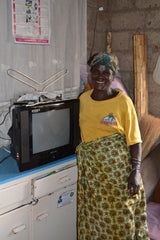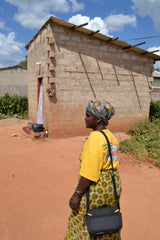Move That Bus!
Housing. This may not be the first think you think of when it comes to alleviating poverty, or doing work in a third world country. For most people (including myself) they think initially of food and water. Not a bad thing; just detrimental when you stop there. I remember my first experience with poverty (probably around age 7 or 8), I was with my parents in downtown Cincinnati. I remember wondering why there were people on the streets begging for money, in tattered clothes, dirt inches under their finger nails, and a sign that asked for spare change. It seemed so foreign to me, as I was raised in a well off home with food, clothing, and material goods in abundance. My gut reaction in this instance being; okay they need food. Which is right. They do need food. But they also need more than that. My itty bitty brain just stopped at the fact that if they were fed, all was well. Can anyone relate? What I didn’t consider was the homes they were going back to, perhaps it was a small apartment or home in the city, but for a lot of them it was probably a space under a bridge in the middle of the city, perhaps with a tent if they were lucky. I had prioritized in my brain what I thought of as the most important thing; food, and nothing else.
Unfortunately, I think that’s where a lot of us fall as well. Most likely not on purpose. However, I think a lot of us feel the tug on our heart strings to do something immediate when we walk by the poor man with the 4 year old daughter on the street beginning for next month’s rent, so we give them some dollars or a meal and are on our way. Few of us stop to talk to them about what it would mean to help them out with more than just food. Perhaps because anything more than a quick handout is a bit too involved. Or maybe we think that because we have met that need, that they are automatically cured of their poverty and leave to go to a nice warm home. Or maybe we just think that fulfilling their need for food and water is enough. Their most basic need has been fulfilled! Of course, I’m exaggerating, most people do not actively think past the initial dollar they give. My point is, there is so much more to alleviating poverty in a generation than just giving food and sustaining them to the next day. Our approach to poverty must be holistic, consistently addressing all their needs as best as we are able. Just because they have a momentarily full tummy, doesn’t mean all their problems go away. Essentially their problem has only been temporarily bandaged. So what's the next step up from these simple hand outs of food? Well, there are a considerable amount, but for the sake of this months topic, I want to highlight the necessity of housing. For our friends in Africa, we know what home life looks like for many of them and the burden this puts on their lives.
The housing deficit in Zambia is currently 2.8 million units, meaning that 2.8 million families currently do not have homes. Zambia as a whole is an increasingly urban city, with the population of their capital city at just over 2.5 million. However, according to Habitat for Humanity- Zambia, 70% of these urban dwellers live in unplanned settlements with inadequate access to safe and clean water, sanitation, hygiene, and extension facilities. Many people move to the cities from rural villages in hopes of finding better jobs and educational opportunities. However, while the jobs are more abundant in urban settings, the cost of living is usually much higher. So, many urban immigrants end up settling in large slums. As you can imagine, the quality of these living conditions are very poor. These “homes” are often made out of a crude cinder block, meaning if you drop em’, they shatter. Doors are often times sheets of fabric in front of a door way. Windows are few and far between. Running water is practically unheard of. And plumbing is a luxury rather than a necessity.
So, you as you can imagine, there are a lot of negative ramifications from living in these slums. Disease spreads quicker because of the lack of hygiene. Crime is higher due to lack of security. Plus, a good nights sleep is hard to come by with the noise, distraction, and constant fear that comes with the living environment. The crazy thing is, this is what they know. For most of them, they are fairly content. As long as there is food on the table for their families, they’re content. They live day to day in survival mode. The thought of saving up for a home of their own, outside of the slum is probably not a thought at all. But that’s where we come in.
So what do we do about this problem? It starts with savings.
If you all have been following along with us for a while, or have read our previous blog (Wait, Poverty Still Exists #1), then you know we’re pretty big on teaching our members how to save their money. The moment someone enters our program here at RecycloCraftz, we want them to start dreaming big. In this program, they learn that it is possible to both provide the necessities for them and their families, AND save towards something bigger. Most of the time, once they’ve realized how much money they can actually save we don’t have to tell them, “hey have you ever thought about building your own home or getting electricity, etc.”, that’s one of the first things they want to do! Throughout the years we’ve seen so many housing success stories. For the sake of your time, we’ll only share one ;).
Jennifer Njobvu is a 66 year old widow and mother of 10. Before her husband passed, she was actually involved in a polygamist marriage. Her husband had one other wife named Falicy, who was a member of RCZ as well, (a story for another time). Before Recyclocraftz, she had never had a job and had no form of income. After her husband passed, her and Falicy were responsible for their combined 18 children and 5 more after Falicy’s sister passed. You can imagine the financial burden on these two women. One day while working as a door mat weaver, Jennifer heard of a “mzungu” (or white women) who had started a handbag ministry, she spent weeks wandering around the city searching for this mzungu, until she landed at Tracy’s (our founder’s) door step. Tracy gave her a pair of scissors and started teaching her how to sew. Throughout her journey with RecycloCraftz she experienced immense sorrows, Falicy and one of her daughters passed suddenly. Despite deep burdens, our founder writes “she is a woman filled with overwhelming joy”.
Some years later, Jennifer had saved up enough money to build her own home. She also purchased: a tv, a fridge, electricity, and a toilet to sit on (however still no running water).

The picture above is Jennifer, she specifically requested that her picture be taken next to her TV because she earned it with the money she had saved through RCZ.

There are several other stories just like Jennifer's that we could share, if you want to hear a few more head over to our facebook or instagram.
We have a far way to go when it comes to providing housing, electricity, running water, and so much more to our members. However, we hope to share many many more stories of transformation in the years and decades to come.
